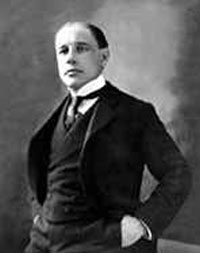Henry Brooks Adams (1838-1918)
Henry Brooks Adams (February 16, 1838 - March 27, 1918) was an American historian, journalist and novelist.
Born in Boston into one of the country's most prominent families (both his great-grandfather and his grandfather had been Presidents of the United States), Adams, after his graduation from Harvard in 1858, embarked on a Grand Tour of Europe, during which he also attended lectures in civil law at the University of Berlin.
 In 1861 his father, Charles Francis Adams, was appointed minister to England by Lincoln, and Henry Adams accompanied him as his private secretary. In 1868 he returned to the United States and settled down in Washington, D.C., where he started working as a journalist. Adams saw himself as a traditionalist longing for the democratic ideal of the 17th and 18th centuries. Accordingly, he was keen on exposing political corruption in his journalistic pieces.
In 1861 his father, Charles Francis Adams, was appointed minister to England by Lincoln, and Henry Adams accompanied him as his private secretary. In 1868 he returned to the United States and settled down in Washington, D.C., where he started working as a journalist. Adams saw himself as a traditionalist longing for the democratic ideal of the 17th and 18th centuries. Accordingly, he was keen on exposing political corruption in his journalistic pieces.
In 1870 Adams was appointed Professor of Medieval History at Harvard, a position he held until his early retirement in 1877, aged only 39. That year he returned to Washington, where he continued working as a historian. In the 1880s Adams also wrote two novels: Democracy was published anonymously in 1880 and immediately became popular. (Only after Adams's death did his publisher reveal Adams's authorship.) His other novel, published under the nom de plume of Frances Snow Compton, was Esther (1884).
In 1885 Marian Adams, his wife, committed suicide. Upon her death Adams took up a restless life as a globetrotter, travelling extensively and, for years, spending summers in Paris and winters in Washington. In 1907 he published his Pulitzer Prize winning autobiography, The Education of Henry Adams. The work concerned the birth of forces Adams saw as replacing Christianity. For Adams the cathedral in Amiens, France, had embodied the old world as the dynamo represented the new. The novel is agreed by many to be the most important non-fiction work of the 20th century.
In 1912 Adams suffered a disabling stroke; in 1918 he died at his home in Washington, D.C.
As a historian, Adams is considered to have been the first (in 1874 -1876) to conduct historical seminar work in the United States. His magnum opus is his History of the United States (1801 to 1817) (9 vols., 1889-1891). It is particularly notable for its account of the diplomatic relations of the United States during this period, and for its essential impartiality. Adams also published Life of Albert Gallatin (1879), John Randolph (1882), and Historical Essays (1891), besides editing The Writings of Albert Gallatin (3 volumes, 1879) and, in collaboration with H. C. Lodge, Ernest Young and J. L. Laughlin, Essays in Anglo-Saxon Law (1876).
Henry Adams's brothers are also notable: 1) His elder brother, John Quincy Adams (1833 - 1894), a graduate of Harvard (1853), practised law, and was a Democratic member for several terms of the Massachusetts general court. In 1872 he was nominated for vice-president by the Democratic faction that refused to support Horace Greeley. 2) Another brother, Charles Francis Adams, Jr. (1835 - 1915), graduated at Harvard in 1856, and served on the Union side in the Civil War, receiving in 1865 the brevet of brigadier-general in the regular army. He was president of the Union Pacific Railroad from 1884 to 1890, having previously become widely known as an authority on the management of railways. Among his writings are Railroads, Their Origin and Problems (1878). 3) Another brother, Brooks Adams (1848 - 1927), practised law. His writings include The Law of Civilization and Decay (1895), America's Economic Supremacy (1900), and The New Empire (1902).
 In 1861 his father, Charles Francis Adams, was appointed minister to England by Lincoln, and Henry Adams accompanied him as his private secretary. In 1868 he returned to the United States and settled down in Washington, D.C., where he started working as a journalist. Adams saw himself as a traditionalist longing for the democratic ideal of the 17th and 18th centuries. Accordingly, he was keen on exposing political corruption in his journalistic pieces.
In 1861 his father, Charles Francis Adams, was appointed minister to England by Lincoln, and Henry Adams accompanied him as his private secretary. In 1868 he returned to the United States and settled down in Washington, D.C., where he started working as a journalist. Adams saw himself as a traditionalist longing for the democratic ideal of the 17th and 18th centuries. Accordingly, he was keen on exposing political corruption in his journalistic pieces.